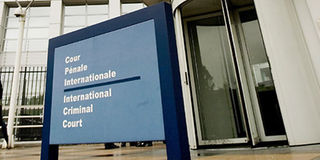Revealed: Secrets of Ruto visit to Hague

The International Criminal Court at the Hague. Photo/ FILE
Also revealed for the first time is the subject of closed-door meetings held between his team of lawyers and representatives of the ICC during the visit two weeks ago.
Well-informed sources at The Hague and in Kenya who did not wish to be named owing to the confidential nature of the information confirmed that Mr Ruto did not meet ICC chief prosecutor Luis Moreno-Ocampo as was widely expected after he arrived a day late for their appointment.
It emerged during Mr Ruto’s visit that two other Cabinet ministers have also been asked to attend an interview with International Criminal Court prosecutors.
Also summoned is a former top security official, according to ICC sources who sought anonymity in order to speak freely about the sensitive investigations.
The security official will record statements before ICC-approved Judge Kalpana Rawal in Nairobi later this month.
One of the Cabinet ministers is making plans to travel to The Hague for the interviews with Mr Ocampo next week, Saturday Nation has learnt.
The senior PNU minister is said to be putting together his notes ahead of a planned meeting next week with Mr Moreno-Ocampo.
The minister is said to have written to the prosecutor in response to a letter he received in April 29 this year offering him an opportunity to explain what he knows about post-election violence.
Mr Moreno-Ocampo has announced that he will be taking six top Kenyan leaders before The Hague-based judges by mid next month.
When Mr Ruto went to the Hague, a source at the ICC told Saturday Nation he held meetings on Thursday and Friday, with senior prosecution officials.
Mr Ruto’s legal advisor Prof Kithure Kindiki declined to comment citing client-counsel confidentiality.
The sources, privy to the discussions said Mr Ruto was required to, among other issues, explain why he seemed to be constantly attacking the Waki commission and Kenya National Commission on Human Rights reports.
Secondly, the sources said, Mr Ruto was asked to explain what caused post election violence, in his own view.
The Wednesday, meeting between the ICC representatives and Mr Ruto’s legal team lead by Prof Kindiki and Mr Katwa Kigen, was described, by an official, as “successful” though the two sides disagreed about several issues.
The co-operation agreement between the government and the ICC granting the court the legal status, immunities and privileges in Kenya was signed on September 18 this year.
Mr Ruto’s lawyers took the view that since communication between the ICC and their client to have a meeting begun in April this year, then the opinion that he could be a suspect could have been formed using the Waki Commission report as well as that of the Kenya human rights commission.
The legal team insisted that the Waki team did not have the money and the time to conduct thorough investigations, which is reflected in the report when Justice Waki stated that the matter in question needed further investigations.
The commission, the lawyers are said to have argued, lack the credibility as the commission does not have the “capacity to mount serious investigations”. The human rights commission is mandated to investigate human rights violations.
In response to what caused post-election violence, Mr Ruto is said to have told the investigators that it was due to the outcome of the presidential election.
He informed Mr Moreno-Ocampo’s representatives in the meeting that immediately the results were announced, violence erupted.
It is due to the spontaneous and simultaneous nature of the violence, Mr Ruto argued, which led him to conclude that it was not premeditated.
From then on the violence took a life of its own.
Mr Ruto is also said to have argued before the ICC officials that the unilateral appointment of the then electoral agency commissioners and the rumour that Administration Police officers were to be used as agents for the Party of National Unity caused suspicion about the credibility of the polls.
Failure to respond to the prosecutor’s invitation could signal lack of co-operation and shows a warrant of arrest such an individual will not be bonded.
Lawyer Ken Ogeto told Saturday Nation a voluntary visit to the Hague could be a consideration when a suspect applies for bail after being arraigned in court.
But Mr Ogeto added: “It really depends on the content of the letter. But even suspects have a fundamental right to silence. One cannot be forced to give information. There are no consequences for that,” he said.
The ICC investigation is considered so seriously in government that sources say President Kibaki and Prime Minister Raila Odinga were debriefed on events on the sidelines of last weekend’s Cabinet retreat at Diani, South Coast.
Fears that the names of the two principals in the coalition government – President Kibaki and Prime Minister Odinga –would be dragged into the discussions were baseless since, credible sources have let on that neither their names nor their possible involvement or lack of it in the post-election violence featured nowhere.




